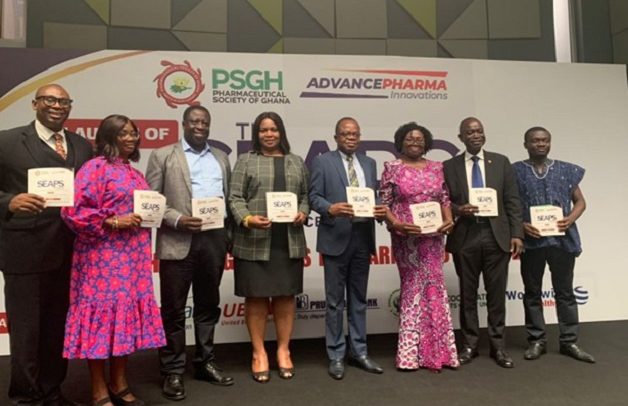Adelaide Yaa Agyeiwaa Ntim, Pharm. Dr. Samuel Donkoh (middle) with officials of the PSGH and GHS
Deputy Minister of Health, Adelaide Yaa Agyeiwaa Ntim, has launched a new project aimed at addressing the challenges in health care delivery especially the lack of access to pharmaceutical services in deprived communities.
The Strategy to Enhance Access to Pharmaceutical Services (SEAPS) project is a flagship initiative of the Pharmaceutical Society of Ghana (PSGH) and will be implemented in partnership with Advance Pharma Inovations, financial institutions and pharmaceutical suppliers.
Speaking at the project launch in Accra Ms. Ntim said the increasing complexity of patients’ health needs and treatment plans call for access to professionals, who are capable of detecting adverse events while handling drug-related issues.
She said pharmacists with their training and qualification can address these gaps in medication management within the primary care settings.
Ms. Ntim said, “Pharmacies are crucial in primary healthcare, and integrating them can enhance patient outcomes, reduce costs, and improve public health.”
While commending the PSGH and partners for the initiative, she said it was important to expand access to primary healthcare system to be more inclusive, incorporating all licensed primary health care providers in the delivery chain.
Director of Pharmaceutical Services at the Ghana Health Service (GHS), Dominic Akorsah Okyere, said the country has over the years undertaken major steps to improve health outcomes especially in strengthening Primary Health Care (PHC) by committing and adopting the Community-Based Health Planning and Services (CHPS) since 1999.
He also urged pharmacists to position themselves at the forefront of the health care system.
President of the Pharmaceutical Society of Ghana, Pharm. Dr. Samuel Donkoh, said 80% of Ghanaians use community pharmacy services for what it considers minor ailments hence the SEAPS project would help patients not to travel long distances and also address the health disparities in these underserved areas.
“The project is not about pharmacists, it is about the wellbeing of the Ghanaian people. It is about the mothers who travel long distances to get medication for their children, and the elderly who need timely access to their prescriptions,” he stated.
By Ebenezer K. Amponsah


